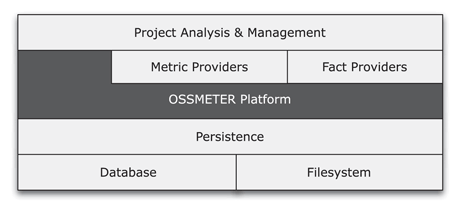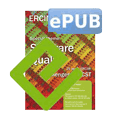OSSMETER is a FP7 European project that aims to extend the state-of-the-art in the field of automated analysis and the measurement of open-source software (OSS). It also aims to develop a platform that will support decision makers in the process of discovering, comparing, assessing and monitoring the health, quality, impact and activity of OSS.
Deciding if an open-source software (OSS) project meets the standards required for adoption, in terms of quality, maturity, the activity of the development and user support, is not a straightforward process. It involves exploring a variety of information sources including OSS source code repositories, communication channels (e.g., newsgroups, forums and mailing lists) and bug-tracking systems. Source code repositories help the potential adoptee to identify how actively the code has been developed, which programming languages were used, how well the code has been commented and how thoroughly the code has been tested. Communication channels can identify whether user questions are being answered in a timely and satisfactory manner and help estimate how many experts and users the software has. Finally, bug-tracking systems can show whether the software has many open bugs and the rate at which those bugs are fixed. Other relevant metadata such as the number of downloads, the license(s) under which the software is made available and its release history may also be available from the forge that hosts the project. If available, this myriad of information can help OSS adoptees make informed decisions, however, the disaggregated nature of the information makes this analysis tedious and time consuming.
This task becomes even more challenging if the user wishes to identify and compare several different OSS projects that offer software with similar functionality (e.g., there are more than 20 open source XML parsers for the Java programming language) and make an evidence-based selection decision. Following the product selection, the software still requires on-going monitoring to ensure it remains healthy, actively developed and adequately supported throughout its lifecycle. This is crucial for identifying and mitigating any risks that emerge as a result of a decline in the project’s quality indicators in a timely manner.
OSSMETER is a Specific Targeted Research Project (STREP) under the Seventh Framework Programme for research and technological development (FP7). The project began in October 2012 and will end in March 2015. A number of different European organizations are involved in the project: The Open Group, University of York and University of Manchester (United Kingdom), CWI (Netherlands), University of L’Aquila (Italy), Technalia (Spain), Softeam (France), and Uninova and Unparallel Innovation (Portugal). OSSMETER aims to: extend the state-of-the-art in the field of automated analysis and the measurement of OSS; and develop a platform that will support decision makers in the process of discovering, comparing, assessing and monitoring the health, quality, impact and activity of OSS. To achieve these goals OSSMETER will develop trustworthy quality indicators by providing a set of analysis and measurement components. More specifically, the OSSMETER platform will provide the following software measurement components [2]:
- programming language-agnostic and language-specific components to assess a project’s source code quality;
- text mining components to analyse the natural language information extracted from communication channels and bug-tracking systems and thus, provide information about communication quality within the project and community activity (around the project); and
- software forge mining components to extract project-related metadata.
After this data is extracted by the platform, it will be made available via a public web application, along with its decision support tools and visualizations.

Figure 1: The tiered architecture of the OSSMETER system.
With almost six months to go, the OSSMETER team is planning to release a beta-version of the platform to the project’s industrial partners to support the analysis of OSS projects hosted on SourceForge, GitHub and Eclipse forges. The OSSMETER platform is scheduled to be publicly available at the beginning of 2015. The OSSMETER team will run a public version of the platform which will analyse a number of OSS projects and the results will be published on the OSSMETER website. Furthermore, the platform will also be available for download for personal analyses.
Link:
OSSMETER project: http://www.ossmeter.org/
Reference:
[1] N. Matragkas et al.: “OSSMETER D5.1 - Platform Architecture Specification”, Technical Report, pp. 1- 32, Department of Computer Science, University of York, York, UK, 2013 (http://www.ossmeter.eu/publications)
Please contact:
Nicholas Matragkas
University of York
Tel: +44 (0)1904 325164
E-mail:











